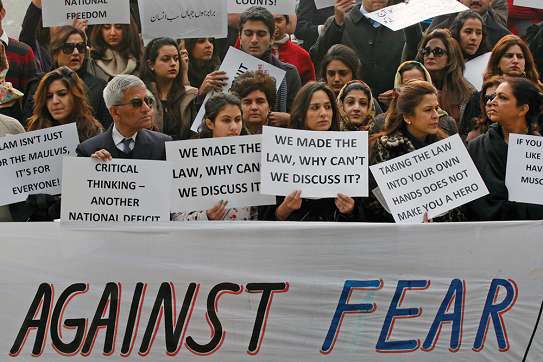Pakistan Ropes In Facebook To Fight 'Blasphemy'
NEW DELHI: Pakistan has asked Facebook to look into so-called “blasphemous” content posted by Pakistanis on the social media platform. The Interior Ministry says that Facebook has agreed to send a team to Pakistan to look into the administration’s reservations.
The news comes after Pakistani Prime Minister Nawaz Sharif reaffirmed his resolve to crackdown on “blasphemous” activities on social media, calling blasphemy an "unpardonable offence". “The blasphemous content on social media is a nefarious conspiracy to hurt the religious sentiments of the entire Muslim ummah,” Sharif said in a statement posted to the PML-N’s official Twitter handle. Earlier the same day, the National Assembly passed a resolution condemning blasphemous content posted on social media and unanimously agreed to the formation of a committee of parliamentary leaders to monitor such content.
Interior Minister Chaudhry Nisar said Thursday that Pakistan will take "any steps necessary" to curb blasphemous activity. "Facebook and other service providers should share all information about the people behind this blasphemous content with us," he said (as quoted by Dawn News).
“Such content has been posted on social media websites for years. I am surprised that no other Muslim country raised the issue till now,” Nisar said at a press conference in Islamabad. "We will take any steps necessary to make sure that our message against such content gets across to those websites as well as the rest of the world… We cannot put a handle on things until Facebook and these other websites help us, but when it comes to uploading done from within Pakistan, we have nearly pinpointed from where it is happening through the Federal Investigation Agency (FIA) and other intelligence agencies."
“"Since this has become an international issue, I have also asked the FIA to find good legal counsel on the matter. They have been instructed to find a lawyer that understands international law and can advise us on these matters," Nisar added. "I have asked the Foreign Office to appoint a representative in the US to liaison with the Federal Bureau of Investigation and these social media websites on a daily basis," he said.
"Apart from all these measures, I still warn that we will take the matter to whatever end is necessary if these platforms do not comply with our demands," the Interior Minister concluded.
Blasphemy remains a sensitive issue in Pakistan, where the country’s tough anti-blasphemy laws are often invoked. Critics, however, allege that the law is misused to silence and curb dissent, and even attack and punish the country’s minorities. A report by the United States Commission on International Religious Freedom says Pakistan’s use of the blasphemy law is “incomparable” to anywhere else. 14 people are currently on death row in Pakistan and 19 others serving life sentences for charges of blasphemy against Islam.
A Human Rights Watch report states that “abuses are rife under the country’s abusive blasphemy law, which is used against religious minorities, often to settle personal disputes.” The report notes that at least 16 people were on death row for blasphemy and another 20 were serving life-sentences in 2013. The Human Rights Commission of Pakistan (HRCP) stated that 34 people were charged with blasphemy in 2013.
The blasphemy laws, which relate to Section XV Articles 295-298 of the Pakistan Penal Code, are indicative of the growing intolerance and religious radicalisation in Pakistan. Although the Pakistan Penal Code always had a provision to safeguard against blasphemy, it was only in the 1980s that Islam was singled out receiving specific articles. In 1982, under General Zia-ul-Haq’s regime, the death penalty and life imprisonment were added as punishments relating to the law.
The laws themselves are quite expansive. They prohibit expression that is intended to wound “religious feelings,” and deliberate or malicious acts intended to “outrage religious feelings of any class by insulting its religion or religious beliefs;” the laws specifically, through the provisions added in the 1980s, prohibit defiling the Quran and insulting the Prophet Muhammad, his wives, family or companions. The “misuse of epithets, descriptions and titles” is also prohibited. Following the 1982 amendment that introduced the death penalty and life imprisonment, an amendment in 1992 made the death penalty mandatory for individuals convicted of making derogatory remarks about the prophet. Since then, successive governments - both Benazir Bhutto and Pervez Musharraf expressed their commitment to amend the law - have failed to introduce measures to change the law, succumbing to pressures by extremists and clerics.
Critics of the blasphemy law have often been targeted, a famous example being Salman Taseer who was assassinated by his guard after defending Asia Bibi, a Christian woman charged under the blasphemy law. In 2011, Pakistan’s Minority Affairs Minister Shahbaz Bhatti was gunned down after he campaigned for changes to the law - specifically the provision that judges be required to investigate cases of blasphemy before registering cases and a measure for punishment for false accusations. In July 2013, two brothers who were charged with defaming the prophet were shot dead as they stepped out of a courtroom.
The blasphemy laws exist in the social-cultural-political context of targeted attacks on religious minorities. They are representative of a climate that fosters intolerance and impunity, perpetuating grave human rights violations. Ironically, the laws are indicative of the erosion of the rule of law in Pakistan, with government institutions are at the mercy of islamist extremists - as evinced by the murder of Salman Taseer and Shahbaz Bhatti, or the failure of Benazir Bhutto or General Musharraf to amend the law despite publicly declaring their intention to do so. The latest developments centering on the Sharif government's resolve to crackdown in blasphemy is located in the above context.





